Cross Keys Alley
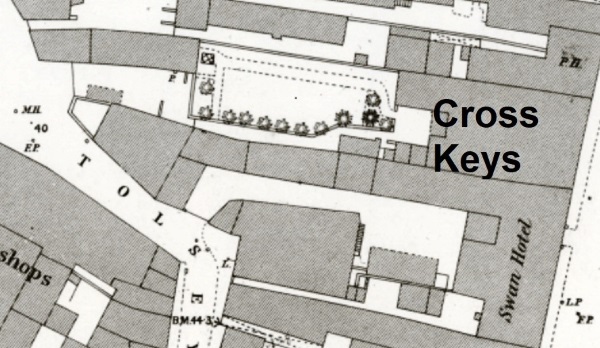
We know nothing about its early life as a tavern, but it rose to prominence in the Georgian era. Coaching was its life blood. It rose in importance as turnpike roads made travel easier, and it died slowly as the railways replaced coaches. The inn offered hearty meals and beds for the night as well as owning a stable of horses for hire as ‘post horses’, either with a carriage and ‘post boy’ or for riding to an inn with which it had a reciprocal agreement. Business must have been cut-throat because as early as 1838 posting was being advertised to Cheltenham, Worcester, Bromsgrove and Birmingham at 15 pence a mile, a discount of threepence.
Not only did it serve the needs of travellers, but it was also a centre for business and social events in the town. The better classes attended Subscription Assemblies, or dances. As the name suggests, attendance was by subscription and involved complicated etiquette, mimicking the events in centres like Bath and Cheltenham. The better establishments in town; especially the Assembly Room in the Town Hall (now the Council Chamber), the Swan, the Hop Pole and the Cross keys held a short series in the ‘season’, part of a way of life captured by Jane Austen.
to Expand
In November 1857, the ‘Register’ reported on the opening of the Corn Exchange, now the front area of the Town Hall. They observed that gentlemen attending the market ‘would no longer be compelled to stand in the public street or, in wet weather, take refuge in the miserable alley of the Cross Keys’. Whilst this wasn’t an alley under the proper definition, investigating it does lead us to an interesting, and forgotten, area of Tewkesbury’s past.
The Cross Keys was a coaching inn, described as the second most important in Tewkesbury. It stood on the High Street, at No 11. The front is now occupied by Greggs and the HSBC bank. The alley referred to was the passage for horses and carriages which ran through to the stables at the rear, and to Back of Avon. If you stroll round to the rear, the remnants can still be seen. The recently renovated ‘Old Boat House’ was the stable block (with a cottage where the garage now is at the western end) and if you look up the plot, the arch in the back of the High Street building is all that remains of the ‘alley’. The oldest map we have dates from 1883, after the inn closed. Buildings in what was the alley had already been demolished and the layout was not dissimilar to today, but it is easy to imagine a bustling, built-up inn yard being there.
Though it is likely that the early building was timber-framed, it was altered, probably in the late eighteenth century, to the brick-fronted building which can still be seen on the upper floors. Like the old Swan next door, the ground floor has been extensively altered to create spaces suitable for modern commerce.
to Expand
The Cross Keys also provided a forum for public meetings and political debate. At the beginning of the nineteenth century the debate was heated, especially in Tewkesbury, where the old Borough returned two members two Parliament and there was a strong movement locally for reform of the Borough Council and nationally for parliamentary reform. The inn became a centre for reformers and liberals. In 1813 John Martin MP was chairing public meetings to lobby against the corn tolls being imposed by the Borough, which were damaging trade. In 1831, Charles Hanbury Tracy stood for election as a reformer, and Whig.; His election committee was based at the Cross Keys. He lost, but won the seat a year later. His celebratory dinner was presided over by Hon. Grantley Berkeley. In 1837, it was John Martin who was again celebrating, this time about local government reform. He addressed the townspeople, assembled in the High Street, from a window of the inn. Four years later, he was back in the news, when he underwent a ‘chairing’ ceremony. Despite the name, this was a day of celebration, beginning with the killing of lots of fatted calves (seven prime beef, seven sheep and several lambs) which were distributed amongst the poor, such that a savoury odour pervaded the whole town. Mr Martin then perambulated the decorated streets in his carriage, to great acclaim, finishing at the Cross Keys with a ‘grand dinner most numerously attended’.
The most interesting politician to frequent the Cross Keys was Humphrey Brown. Son of a local merchant, he was the first Tewkesbury-born MP and the first candidate ever to get no votes. He was described as having an uncontrollable love of speculation, which got him into lots of scrapes, and eventually into prison, following the collapse of the Royal British Bank. He remained a local hero, though, and on his release from prison and return to Tewkesbury the Abbey bells were rung and his carriage was met at King John’s bridge, where the horse was replaced by townspeople, who pulled him through the streets, preceded by musicians, to the Cross Keys. He spoke to the cheering crowds from the window. They were dismissively described by a generally hostile press as ‘mostly factory workers’; people who had no vote.
At a municipal level, the Inn was implicated in a chaotic election in 1855, where both parties used drink to tempt voters. The Liberals in the Cross Keys, it is said, were drawing beer by the bucket. The Swan next door was doing the same in the Conservative cause, and the streets were full of drunkards. Voting was at the Town Hall, to which semi-conscious electors were dragged and induced to vote, fought over, quite literally, by the agents of the two parties. Turn-out, it was reported, was a very respectable 90%, though only the 708 burgesses were eligible to vote.
Aside from travel and politics, the main business of the inn was auctions. In days before estate agents almost all property, from large farms or mansions to humble cottages, was sold by auction in inns, as were all manner of other things. The Cross Keys was an early auction room for the Ham aftermath, and for all its life it was where the turnpike tolls were auctioned and the Turnpike Trust held their meetings.
By 1870, the tide had turned for coaching inns and the Cross Keys wasn’t able to compete for railway customers. Things had been going downhill, and maybe the nadir was when Mary Ann Procter was fined for throwing a spittoon which hit Ann Wakefield. Such petty disorder was unheard of in the past. In 1872, at an auction sale in the Hop Pole, lot four was ‘An old established licenced inn called the Cross Keys Inn, with the brewhouse and other outbuildings, yard, garden and premises thereto adjoining and belonging, now in the occupation of Mrs Ann Wakefield’. Shortly afterwards, the Central Drapery Warehouse opened in the ‘front House’ and the carriage passage was closed forever. It was never an alley in the true sense, but several similar examples survive. Chapel Court, the old Plough (Theoc House) in Barton Street and Bull Passage, now part of the Hop Pole in Church Street, are very visible reminders of an affluent era.
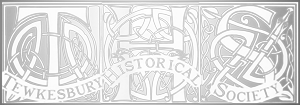
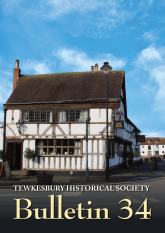
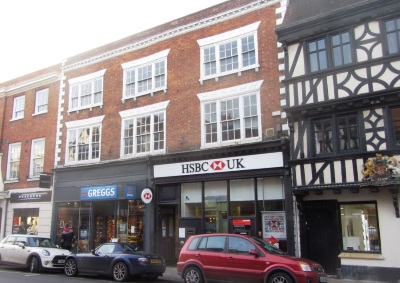
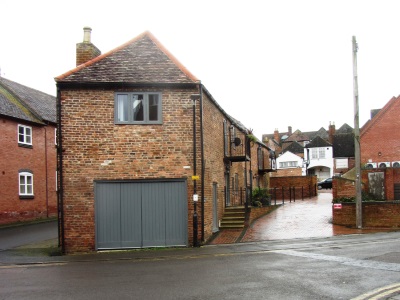
Comments